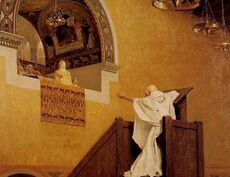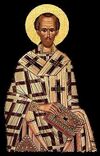Arcadius
“He's a Pinball Emperor, there has got to be a twist.”
“Move on Arcadius. This machine refuses your custom”
Arcadius (Flaccidus Arcadius Pinball Wizardus Augustus ), Roman Emperor 395-408, Maximus Scorus 36, Braggadium Dexterus, eldest son of Theodosius the Great, holder of the Golden Lavatory Key and other titles with pension rights attached is usually also counted as the first Byzantine ruler in Constantinople. Weak of chin, long of dribble and with the strong political convictions of a soft pillow, Emperor Arcadius lolled on the imperial throne for an unremarkable 13 years.
With no known abilities except to hang around amusement arcades (hence his name), Arcadius got the better end of the deal when his father Theodosius chose to divide up the Roman Empire between his two sons. His younger brother - the even more useless Honorius - got the Western Roman Empire and residency rights in Rome, Milan and Ravenna. Theodosius appears to have been aware that neither of his boys would cut the military mustard and had arranged for his generals Stilicho (always described as a 'half vandal' by contemporary Roman historians) and Rufinus 'Roughstuffus', a big smelly Gaul to stand behind them and twist their ears if they got out of line.
Early Life[edit]
Arcadius was born in Spain. His father Theodosius and grand daddy Theodosius the elder were soldiers but there is no record of Arcadius having any military experience. In 379 his father became emperor and four years later Arcadius became 'co-Emperor' in the Eastern half of the empire. He seems he spent most of his time in bingo halls where his pinball skills gave him the name 'Arcadius'. Now with his own wing in the Imperial palace in Constantinople. Arcadius had a marble lined games room installed where he could hang out with friends and drink a lot of gut churning wine.
Emperor and Husband[edit]
In 392 Theodosius left Constantinople to claim the Western Empire from a usurper. He took with him Honorius. Arcadius would see neither of them again but seems not to have been bothered. In early 395 he received word that his father had died in Milan and that he was now on his own in the East.
Either that he was lazy or was an accurate judge of his own abilities, Arcadius left the running of the empire to his father's henchman Rufinius as de factor Deputy Top Banana. The emperor's friends in the play den expected him to get back to them but instead he married a pious prig called Eudoxia. She closed down the den, broke up Arcadius's pinball machine and informed Arcadius that he was staying in on Saturday nights for his 'domestic duties' (imperial family breeding).
Rufinius was the first casualty in the new broom policies. Eudoxia had him stabbed and replaced with one of her friends. Her next task was to remove the Goths from Greece where their king Alaric was living off imperial welfare. The cheques were stopped so the Goths decided to look for jobs/sacking opportunities in the Western Roman Empire. Arcadius celebrated his 'triumph' by commissioning a column in Constantinople to record his military victory over the Germanic fashion victims. It was once as tall as the columns of Trajan and Marcus Aurelius but got castrated by the Turks in the 17th century when it started to badly droop.
Bothersome Bishop[edit]
In 397 a fanatical ex-hermit, anti-Semite, anti-fun Christian called John Chrysostom became Archbishop of Constantinople. He was also an anti-sports, once jumping into the Hippodrome in full religious clothing to stop a gladiatorial contest and punched out the chariot drivers. John's muscular Christianity also closed down the last pagan fun houses and made everyone gloomy.
Arcadius took the bullying but then John attacked the empress and her court for their fashion. At the Constantinople 403 Spring Collection, John entered the hall and physically abused the women present as Jezebels. Eudoxia demanded John be crated off into exile and when Arcadius appeared not to listen, tore up the emperor's best purple toga.
John Chrysostom was arrested in the Hagia Sophia and bundled onto a slow Ass to the Western Roman Empire. Then Eudoxia suffered a pain in her stomach and believing the mad bishop did indeed have a direct line to God, let him go again. Chrysostom asked everyone to repent their sins and, with a sledge hammer, destroyed Arcadius's last remaining pinball machine. The emperor excused himself and stayed in his purple bed for the following week.
With the emperor and his wife humiliated, Chrysostom extended his crusade of fiery abuse to other bishops and Christian leaders and suggested none of them were any good. He also demanded all women wear sacks over their heads to prevent 'temptation' and then had another ago at Eudoxia for what she liked wearing in public. The empress she was so upset by what the bishop had said, she died suddenly. Chrysostom's allies said she died for acting 'uppity' with a religious man.
For what ever his other faults were, Arcadius really missed his wife and the mother of his children. This time he banished Chrysostom to a tumbleweed imperial outpost in wild Caucasian mountains. Pope Innocent in Rome with the backing of Emperor Honorius sent an embassy to Arcadius to recall the Chrysostom but by then the preacher man was dead. Arcadius imprisoned the embassy party for challenging his ruling and took away their trousers. Back in Rome Pope Innocent said Chrysostem had died like a saint, persecuted by unjust imperial power.
Death[edit]
Arcadius received the news and a request to have Chrysostom buried in Constantinople. The emperor refused but a just a few months later he was dead too. His pinball machine remained unrestored and was melted down and converted in to fish knives. Followers of Chrysostom claimed Arcadius had died in agony, his soul flipped and bounced down into hell by a demon in the shape of a pinball machine. Whether that was true or not, some years later Arcadius's son and successor Emperor Theodosius II believed it so and returned Chrysostom's bones to Constantinople.
References[edit]
| Preceded by: Theodosius the Great |
Roman Emperor 395-408 |
Succeeded by: Theodosius II (in the East) |
| ||||||||||||||||||||||||||





